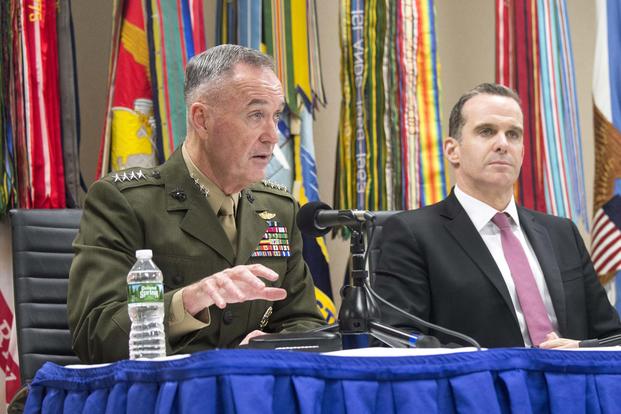Joint Chiefs Chairman Gen. Joseph Dunford has framed the U.S. military presence in Niger as part of an overall global strategy to join with local forces in stopping the spread of the Islamic State and other extremist groups.
He said the U.S. currently is not considering sending additional troops into Niger, where four U.S. soldiers were killed and two others were wounded in an Oct. 4 ambush. Five Nigerien troops also were killed in the joint patrol in western Niger near the Mali border.
There have been "no discussions of additional resources" going into Niger or "additional capabilities on the ground. That conversation would be premature," Dunford said at a news conference Tuesday night at Fort Belvoir, Va., that concluded a meeting of more than 70 international chiefs of defense "to discuss mutual efforts to counter violent extremist organizations."
Related content:
- US Suspects Niger Villager Betrayed Army Troops
- 2-Hour Air Support Delay in Ambush That Killed 4 US Troops: Dunford
- Gold Star Widow 'Upset and Hurt' by Trump's Phone Call
In a separate Defense Writers Group breakfast Wednesday, Czech Gen. Petr Pavel, chairman of NATO's Military Committee, said terrorism and instability in Africa "was very much in the center of our discussions" at the conference Tuesday, but "the incident [in Niger] was not specifically mentioned."
Dunford declined to go much further than he did in a lengthy Pentagon briefing Monday on what happened in the Oct. 4 ambush that killed Sgt. La David Johnson, 25, of Miami Gardens, Florida; Staff Sgt. Bryan C. Black, 35, of Puyallup, Washington; Staff Sgt. Jeremiah W. Johnson, 39, of Springboro, Ohio; and Staff Sgt. Dustin M. Wright, 29, of Lyons, Georgia.
He said he was aware of reports by NBC News and other outlets, citing defense officials, that the patrol may have deviated from its reconnaissance mission to go after a "high-value target" on bogus information from villagers that led them into the ambush, but he would not confirm the reports.
As for details on what happened on the ground, Dunford said, "Anything you've seen in that regard is speculation." He did, however, state the CIA was not involved in planning the patrol.
Under their rules of engagement, the 12 U.S. soldiers who joined 30 Nigerien troops on the patrol "were authorized to accompany Nigerien forces when the prospects for enemy contact was unlikely," Dunford said.
"We know what the mission was initially, we know what the [threat] assessment was initially," he said, but he was "not willing to speculate" on when or how contact was made, what happened after that or how the body of Sgt. La David Johnson was not found until two days after the attack.
Dunford deferred to an ongoing Article 15-6 fact-finding investigation of the incident being conducted by a general officer. "Those are the kind of questions that the investigation is designed to uncover," he said.
His top priority is to share the findings of the investigation with the families of the fallen first, Dunford said. "That's my primary target audience right now. We'll address it fully" in public once the families are informed.
Dunford and Brett McGurk, the White House special envoy for the Global Coalition to Defeat ISIS, said the recent string of setbacks for ISIS in Iraq and Syria raised concerns the group would seek to gain footholds in other areas or manipulate local insurgents.
"We are dealing with a transregional threat, and it is going to require more effective collective action by nations that are affected," Dunford said.
"The most effective action against these groups is local action, but local action has to be informed by the nature of the transregional aspect and so cooperation globally is important," he said.
-- Richard Sisk can be reached at Richard.Sisk@Military.com.




























